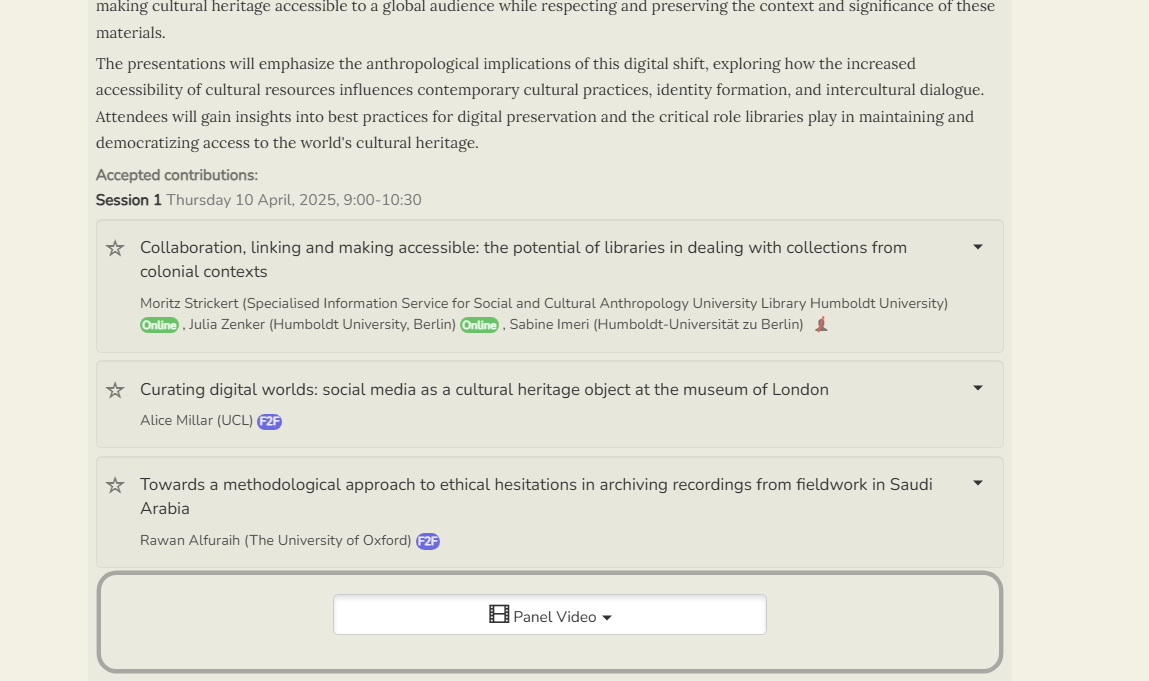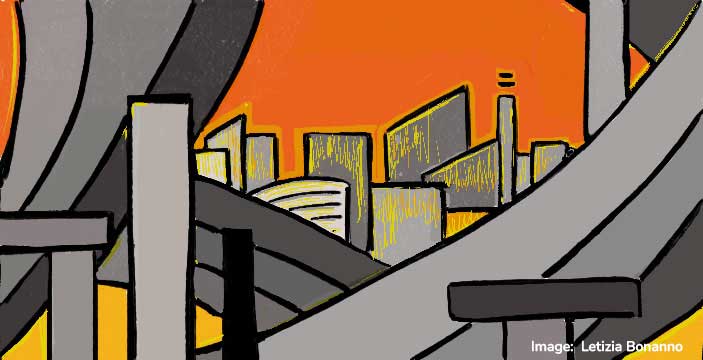Useful information for delegates
Conference format and timetable
The conference ran for four days, with day one slightly shorter than the three following days. The Firth lecture/Keynote took place on the opening day, as well as a plenary event on each following days. All keynotes/plenaries addressed the conference theme.
ASA2025 was a fully hybrid conference: all plenaries, lectures, panels, roundtables, and events were streamed on zoom. Delegates on registration were able to choose between online participation and face-to-face participation.
Recordings are available for all content via the programme, only those who specified a wish to be omitted are missing. See below for instructions on how to access recordings.
Certificates of attendance
Certificates of attendance are generally emailed out once attendance has been finalised, this sometimes means checking with those not marked in, in case of omission by the reception desk or admin office.
Delegates who have attended face-to-face or online may download their certificate at any time post-conference via their conference management page.

contact: conference(at)theasa.org
Online access information
The conference was fully hybrid and supported by a team of administrators. This meant that convenors did not need to set up or run their zooms on the week, this was done by a tech team and supported by a team of local volunteers.
How to find the recording links
All registered delegates have access to the conference recordings via the conference programme. This is includes those registered as face-to-face, as well as those registered as online.
In order to access the recordings you need to be registered and logged in.

Once logged in the message and log in button in the programme disappear and the website is showing that you are now 'logged in'.
Only logged in and paid up delegates will see the recording buttons in the programme.
Buttons for panel recordings are below the abstract and listed papers.

The same buttons appear on plenaries, the Firth lecture, keynotes, etc.
Any queries with the above please email conference(at)theasa.org
Formats: panels, roundtables, laboratories
This conference had panels in various formats:
- Panels are structured in the traditional manner of four papers per 90-minute session. Panels with more than four papers accepted were allocated additional sessions depending on the number of proposals received.
- Roundtables in which a group of scholars (no more than 5) discuss particular themes/issues in front of (and subsequently with) an audience. While a roundtable can include short (5-10 min) provocations/presentations, the main idea is to create a lively debate, not to focus on any one presenter. Roundtables are limited to one 90-minute session.
- Laboratories are characterised by experimentation, collaboration, interaction or improvisation, bringing the focus to research methods, the ethnographic process and the mode of expression in presenting results. Rather than exhibiting already finished work, the aim of laboratories is to organise collective research activities that are open-ended and cultivate possibilities for surprise, novelty and learning. Laboratories are designed as interactive, reflexive sessions that prioritise exploration, rather than the discussion of already established research results. They can be used to tackle practical problems, to re-evaluate concepts, to find new theoretical and political directions, or to understand emergent cultural dynamics. Whether concerned with possibilities and limitations in current anthropological practice, or with cultural and political problematics in an unequal world, labs can provide space for addressing any themes in creative, interactive, and open-ended fashion.
Rules
The following rules applied during the conference:
- All panels/roundtables must have at least two convenors, so as to avoid session cancellations if one convenor cannot attend the events
- Delegates (those attending the conference) may only make one presentation each (please note that a roundtable contribution counts as being a discussant, not a presenter). You may be a co-author on multiple papers if you are not the one presenting them. In addition, a delegate may also convene once (be that a plenary, panel, lab or roundtable) and be a discussant or a chair in one plenary session, panel, or roundtable.*
- You do not have to be an ASA member to present or convene content. However, conference registration prices for members are notably lower than for non-members, so there may be a financial incentive to join the Society.
- All those attending the conference, including discussants and chairs, will need to register and pay to attend.
*Multiple roles in the conference
Each participant is permitted to present a paper once, convene once (either a lab or a panel), be a discussant once (in a panel, lab or roundtable), be a chair once (in a panel, lab, or roundtable). Please note that roundtable participants are considered discussants.
Communication between authors/convenors
While convenor/author email addresses are not displayed on the panel pages for privacy reasons, the in-built secure email messaging system allows site visitors to email convenors with queries.
How to share your panel page with others
Click on the panel header to expand the panel details and then click on the circular share icon to find different options: email, Facebook, X, etc.
Scam-aware
While our database is secure, a search for 90% of academic names (listed as convenors/authors) yields an active email address which can be spammed by scammers posing as conference accommodation support services, requesting payments/personal info (we do NOT use such providers); or sent spoof emails purporting to come from Council/Committee/Exec members requesting financial assistance. Please check the sender information carefully and the grammar of such requests, and if you do not recognise the email address as ours or the grammar is somewhat 'off', delete such emails. We cannot prevent receipt of these emails which do not come via our system.
Accessibility guidelines
Capacities for vision, hearing and sustained interaction in large crowds vary between people, and wax and wane for each of us from hour to hour and over the course of our lives. Conference participants are encouraged to follow these common accessibility guidelines, so as to make their presentation and other activities within the conference as accessible as possible.
Besides ensuring all colleagues are equally supported in their desire to participate, maximising the accessibility of presentations and discussions helps reach a wider academic audience.
Recognising the diversity of experiences, we accept that you may need to interpret/ignore these guidelines, in interest of your own health.
On-site accessibility, best practices for delegates, convenors and presenters - read more here.


